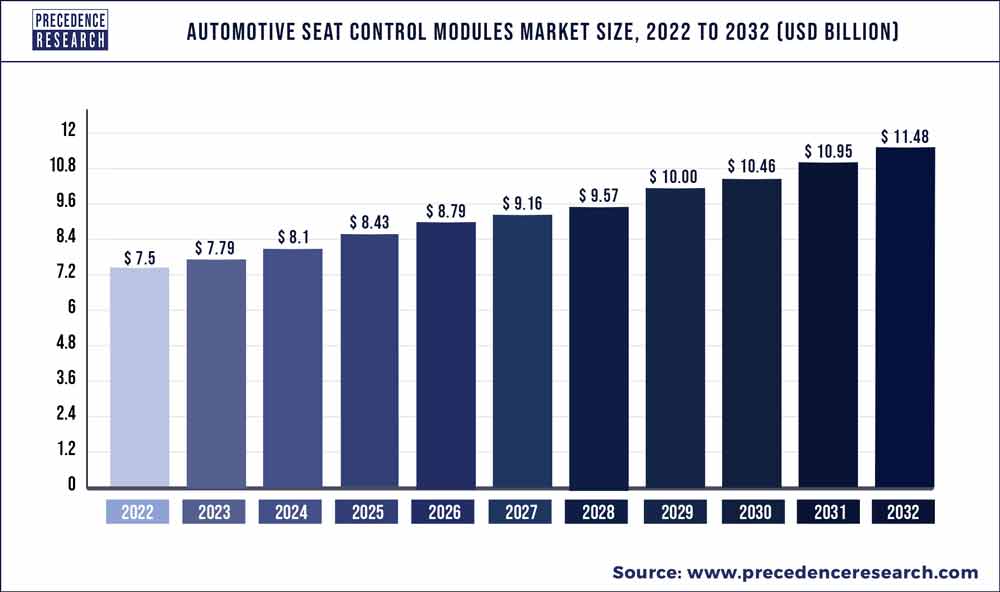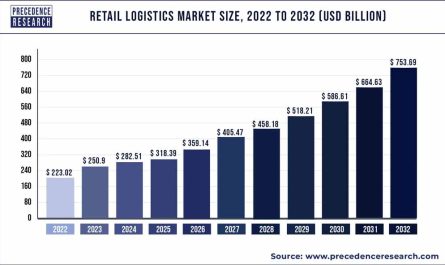The automotive seat control modules market is a vital segment within the automotive industry, essential for providing comfort and convenience to vehicle occupants. These modules enable users to adjust various parameters of their seats, including position, temperature, and lumbar support, enhancing the overall driving experience. In this analysis, we will delve into the growth factors, trends, regional insights, and competitive landscape of the automotive seat control modules market.Get a Sample: https://www.precedenceresearch.com/sample/1246
Growth Factors
Several factors contribute to the growth of the automotive seat control modules market. Firstly, the increasing demand for comfort and luxury features in vehicles is driving the adoption of advanced seat control systems. Consumers are increasingly willing to invest in vehicles equipped with customizable seat options, leading automakers to integrate sophisticated seat control modules into their vehicles to meet customer expectations.
Moreover, the rising focus on vehicle safety and ergonomics is fueling the demand for seat control modules with advanced features such as memory settings, massage functions, and active support systems. These features not only enhance comfort but also contribute to reducing driver fatigue and improving overall driving performance, thereby driving the adoption of seat control modules in modern vehicles.
Furthermore, technological advancements such as the integration of sensors, actuators, and electronic control units (ECUs) are expanding the capabilities of seat control modules. Advanced sensor technologies enable seat control systems to automatically adjust seat settings based on occupant preferences and driving conditions, providing a more personalized and intuitive driving experience. Additionally, the integration of connectivity features allows users to control seat settings remotely via smartphone apps or vehicle infotainment systems, further enhancing convenience and accessibility.
Trends
The automotive seat control modules market is witnessing several trends that are shaping the industry landscape. One prominent trend is the increasing integration of smart and connected features into seat control systems. Manufacturers are developing seat control modules with built-in connectivity capabilities, enabling seamless integration with other vehicle systems and external devices. This trend not only enhances user convenience but also opens up new opportunities for data analytics and predictive maintenance, allowing automakers to offer value-added services to customers.
Another notable trend is the growing demand for lightweight and compact seat control modules. As automakers strive to improve fuel efficiency and reduce vehicle weight, there is a growing emphasis on developing seat control systems that are more space-efficient and lightweight without compromising functionality or performance. This trend has led to the adoption of advanced materials and manufacturing processes, enabling the production of smaller and more energy-efficient seat control modules.
Moreover, the increasing focus on sustainability and environmental responsibility is driving the development of eco-friendly seat control solutions. Manufacturers are exploring alternative materials and manufacturing techniques that minimize environmental impact and reduce the carbon footprint of seat control modules. Additionally, the adoption of energy-efficient designs and power management systems helps optimize energy consumption and prolong the battery life of electric and hybrid vehicles, aligning with global efforts to combat climate change.
Automotive Seat Control Modules Market Scope
| Report Highlights | Details |
| Market Size by 2032 | US$ 11.48 Billion |
| Market Size in 2023 | US$ 7.79 Billion |
| Growth Rate | CAGR of 4.40% From 2023 to 2032 |
| Base year | 2022 |
| Historic Data | 2018 to 2020 |
| Forecast Period | 2023 to 2032 |
| Segments Covered | Type, Application, End User |
| Regional Scope | North America, Europe, Asia Pacific, Latin America, Middle East & Africa (MEA) |
Region Insights:
The automotive seat control modules market exhibits regional variations influenced by factors such as vehicle sales trends, regulatory requirements, and consumer preferences. In mature automotive markets such as North America and Europe, the demand for advanced seat control systems is driven by a combination of factors, including a strong emphasis on comfort and luxury features, stringent safety regulations, and high disposable incomes. As a result, these regions account for a significant share of global seat control module sales, with leading automakers incorporating advanced seat technologies into their premium vehicle models.
In contrast, emerging markets in Asia-Pacific, Latin America, and the Middle East are experiencing rapid growth in automotive sales, driven by rising urbanization, increasing per capita incomes, and expanding middle-class populations. While cost considerations remain a significant factor in these markets, consumers are increasingly demanding vehicles with advanced comfort and convenience features, including customizable seat control systems. As a result, automakers are investing in these regions to capitalize on growing market opportunities and cater to the evolving needs of customers.
Competitive Landscape: The automotive seat control modules market is highly competitive, with numerous players competing for market share globally. Key players in the market include automotive component suppliers, electronics manufacturers, and technology companies specializing in seat control systems. These companies invest heavily in research and development to innovate and differentiate their products, focusing on factors such as performance, reliability, and user experience.
Additionally, partnerships and collaborations between automakers and seat control module suppliers are common, enabling seamless integration of seat control systems into vehicle platforms and facilitating technology transfer and knowledge sharing. Moreover, strategic acquisitions and mergers are prevalent in the market as companies seek to expand their product portfolios, access new markets, and strengthen their competitive position.
Furthermore, regulatory compliance and certification requirements play a significant role in shaping the competitive landscape of the automotive seat control modules market. Manufacturers must ensure that their products meet industry standards and safety regulations, which vary across different regions and markets. Compliance with regulations such as ISO standards, Federal Motor Vehicle Safety Standards (FMVSS), and European Union directives is essential for market access and customer acceptance.
Read Also: Retail Logistics Market Size to Surpass US$ 753.69 Bn by 2032
Top Players Contending in the Global Automotive Seat Control Modules Market:
- Hella KGaAHueck& Co
- Delphi Automotive LLP
- Continental AG
- De Amertek Corporation
- Infineon Technologies AG
- Omron Corporation
- Pektron plc
- Advanced Micro Electronics CO., Ltd
- Leopold Kostal GmbH & Co. KG
Major Market Segments Covered:
By Type
- Manual seat control module
- Memory seat control module
By End-User
- Passenger Car
- Commercial Vehicle
By Application
- Headrest positioning
- Climate based seating (heating, air conditioning and seat ventilation)
- Massage
- Seat adjustment (eight-way)
- Others
By Geography
- North America
- Europe
- Asia Pacific
- Latin America
- Middle East & Africa (MEA)
Contact Us:
Mr. Alex
Sales Manager
Call: +1 9197 992 333
Email: sales@precedenceresearch.com
Web: https://www.precedenceresearch.com
Blog: https://www.expresswebwire.com/


